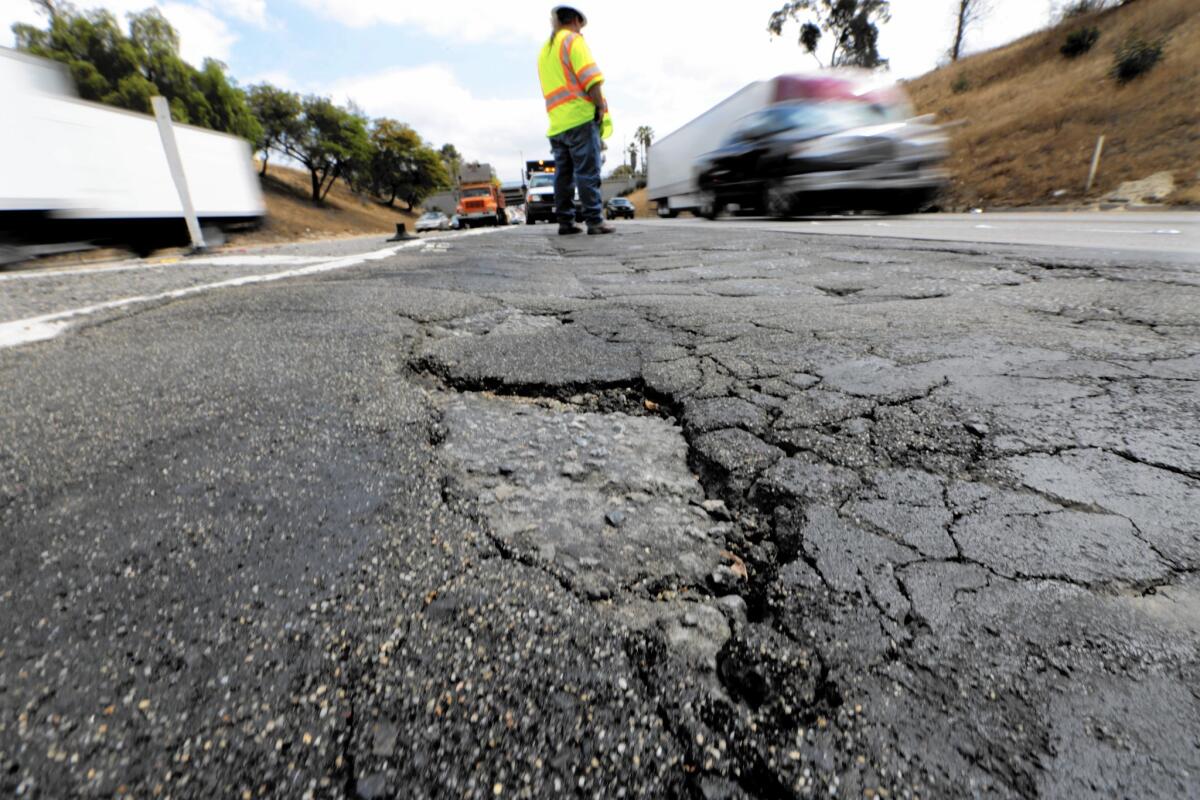Capitol Journal: It’s time for legislators to act, not yak, and fix California’s roads and highways

Reporting from In Sacramento — California’s roads keep getting worse and the governor and legislative leaders keep promising to fix them. And promising.
The pavement and the politicians have one thing in common. All keep failing.
They’ll do it next year, they swear, again and again.
“The administration, Assembly and Senate are all committed to tackling this issue early in the new year to address our critical infrastructure and transportation needs,” read a short memo released last month by Gov. Jerry Brown and legislative leaders.
Yada, yada.
The memo also confirmed that the Legislature would not be meeting in a postelection, lame-duck session to pass a highway-funding bill. They’d earlier yakked about it, but no one really expected them to follow through.
Let’s face it: That was prime junket time for many lawmakers, who were flying here and there, including Maui, with the help of special interests.
That said, let’s keep this in perspective.
Easy as it is to blame the governor and legislators — and they do deserve their share — the primary culprit lies elsewhere and dates back 38 years. It’s the two-thirds legislative vote requirement for passing a tax increase, a burden not faced by most other state legislatures or Congress.
Back when California was building vital public works, including world-class highways, the Legislature could hike the necessary state taxes on a majority vote.
But that ended because of anger over a local levy, the property tax. As property values soared, property taxes spiked unmercifully. The Legislature and Brown, in his first tenure as governor, dillydallied. So apartment housing lobbyist Howard Jarvis seized the moment.
In 1978, Jarvis sponsored Proposition 13, which greatly reduced property taxes. And to prevent the Legislature from raising other taxes to make up for the reductions, Jarvis slipped in a provision that required a two-thirds vote for any state tax hike.
Problem is, highways and bridges are financed principally by user taxes — paid at the fuel pump, at toll booths or through vehicle registrations.
Some people and politicians — mainly Republicans — argue that government already has enough money for roads. Just reprioritize current spending, they say.
For example: junk Brown’s proposed $64-billion bullet train and reroute the money to highways. But that’s a non sequitur. There’s only $8 billion or so available for high-speed rail. And that money legally can’t be spent for anything else.
The last time California raised fuel taxes was 26 years ago when Republican Gov. George Deukmejian pushed hard for legislative passage and a ballot measure.
The big mistake was not including an inflation adjuster. Consequently, the purchasing power of those taxes currently is only about half what it was in 1990.
What’s more, motorists today are pumping much less gas per vehicle because fuel efficiencies are constantly improving.
A national transportation research organization reported in August that poor roads were costing California motorists about $54 billion annually, largely in vehicle repairs.
“It’s a very serious situation,” said former Caltrans director Will Kempton, who heads the advocacy group Transportation California. “The longer we put this off, the worse the roads will get and the more it will cost to fix them.”
“If we let it go too far with these big cracks and potholes,” said Dan Carrigg, acting director of the League of California Cities, “pretty soon we’ll have to jackhammer roads up and do them all over.
“It’s like oil in the car. Would it be nice to skip your oil change? Yeah, but eventually the engine’s going to blow up.”
California’s obsolete highway-funding system needs to be fixed before the roads can be.
About two years ago, Brown totaled up a $58-billion backlog in state highway repairs plus a $78-billion funding shortage for local fixes. There was an $8-billion annual repair need, he said, but only $2.3 billion coming in from user taxes.
So Brown called a special legislative session aimed at highlighting the problem and expediting a solution. Then the governor and legislative leaders went into idle. They had higher priorities.
When the Legislature reconvenes in January, however, just watch, they insist.
“I think we have some psychic energy,” says state Sen. Jim Beall (D-San Jose), one of two legislators who have been earnestly trying to negotiate a compromise. The other is Assemblyman Jim Frazier (D-Oakley).
Psychic energy? “The fact we need to do repairs or it’s going to cost more money is sinking in,” he said.
Also: “The governor now is kind of concerned about his legacy. He doesn’t want to leave the state in a condition that everything is falling apart.”
And there’s this: Democrats recaptured a two-thirds majority of both legislative houses last month. So there’s no longer an excuse. They can’t blame inaction on Republicans.
Beall and Frazier have introduced new legislation that would raise $5 billion annually. It would be split 50-50 between the state and local agencies. Transit would get some. Freight corridors from ports would be improved.
There’d be a gradual 12-cent-per-gallon gas tax increase. The diesel tax also would rise. Vehicle registration fees would go up $38. Non-gas-burning battery cars would pay a $100 annual fee. Truck weight fees would be spent on road repairs. And there’d be a ballot measure to ensure that none of the money could be detoured into non-transportation projects.
This needs to get done soon, before the politicians start overthinking about their next election campaigns.
It’s time to act, not yak.
Follow @LATimesSkelton on Twitter
ALSO
Political Road Map: Get ready for hundreds of extra bills in 2017
More to Read
Get the L.A. Times Politics newsletter
Deeply reported insights into legislation, politics and policy from Sacramento, Washington and beyond. In your inbox three times per week.
You may occasionally receive promotional content from the Los Angeles Times.











